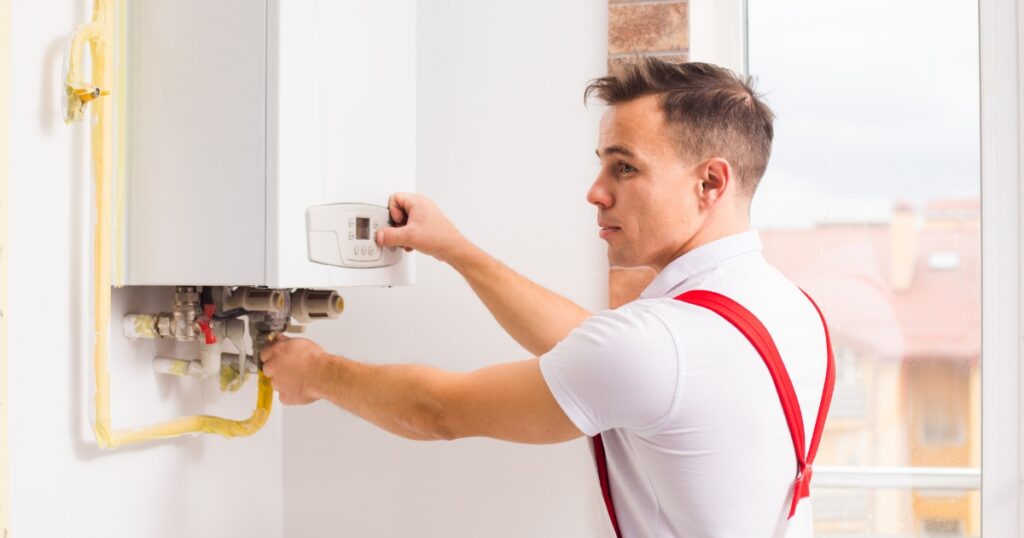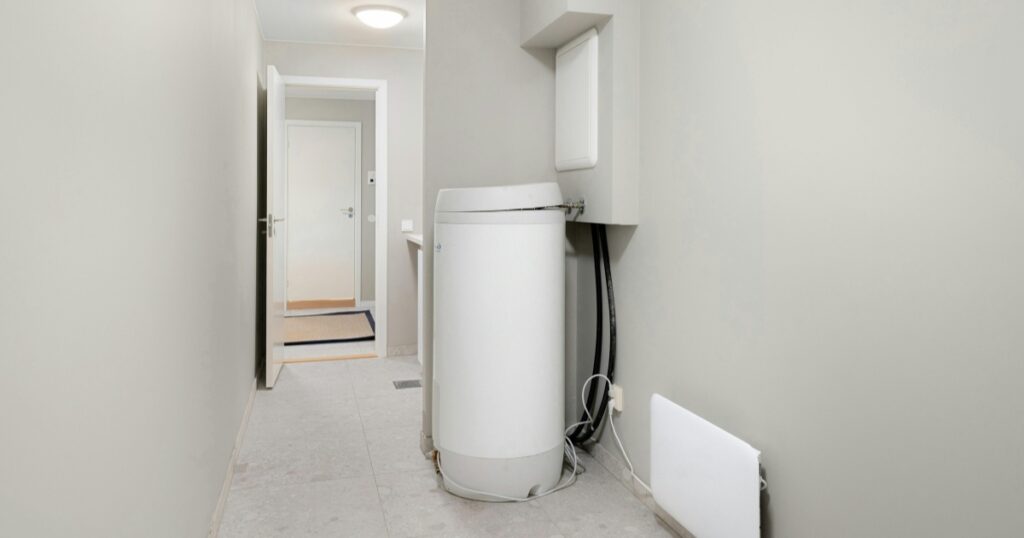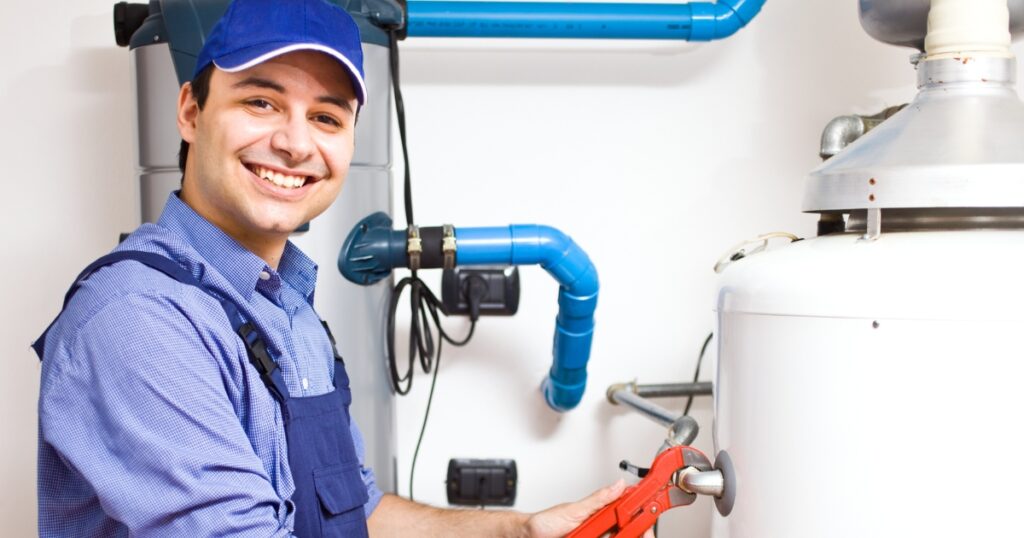Ah, the classic cold shock when the hot water bill hits your letterbox! It’s not just you; we’re all feeling a bit frazzled when that power bill goes through the roof after indulging in those warm showers.
Let’s face it, nearly one-fifth of our home energy costs come from keeping our water warm enough to ward off the winter chills.
Our yarn today is about more than just firing up your boiler for a cosy wash. We’re having a squiz at cutting-edge water heaters that promise to ease up on both your wallet and good old Mother Earth.
So hang tight – it’s going to be a ripper of an article with sparks flying as we explore these nifty new gizmos heating things in ways you wouldn’t believe!
Key Takeaways
- New water heater technologies like hydroponics, electric tankless systems, and solar-powered heating offer cost savings and are more eco-friendly.
- Smart controls and heat pump technology in water heaters provide a continuous supply of hot water and increased energy efficiency without taking up too much space.
- Upgrading to innovative water heaters can reduce the risk of leaks, cut down on repair costs with their longer lifespan, and help the environment by using less energy.
- Electric water heaters are gaining popularity due to lower emissions; advancements may soon allow integration with battery storage for even greater efficiency.
- Future trends show a move towards sustainable solutions that could integrate with smart grids, positively impacting society by reducing energy use and fostering economic growth.
Advancements in Hot Water Heater Technology
Hydronics innovations, electric tankless water heaters, solar-powered heating, smart controls and automation, and heat pump technology are just a few examples of the advancements in water heater technology that are revolutionising the way we heat water in our homes.

These innovations offer increased energy efficiency, continuous hot water supply, space savings, reduced risk of water damage, and longer lifespan for your hot water system.
Hydronics innovations
Hydronics systems are stepping into the future with some exciting changes that make our homes more comfortable and energy-smart. Picture this: water is heated, then whisked through a network of pipes to radiators or underfloor heating panels.
The warmth spreads evenly and quietly, making chilly winter mornings a thing of the past.
We’re seeing amazing leaps forward in how these systems operate. They now pair up with solar power sources and energy-efficient boilers that slash our bills and reduce carbon footprints.
Plus, imagine being able to tweak your home’s temperature from anywhere using smart controls on your phone! These innovations in Hydronics technology mean we can enjoy cosy spaces without stressing about high costs or harming the planet.
Electric tankless water heaters
Transitioning from Hydronics innovations to electric tankless water heaters, we find a game-changing technology in home water heating. Electric tankless water heaters provide hot water on demand without the need for a storage tank, resulting in energy efficiency and cost savings.
These compact units are known for their endless supply of hot water and have a longer lifespan compared to traditional storage water heaters. With smart controls and automation, these electric tankless systems offer precise temperature settings and can be easily integrated into modern homes, making them an appealing choice for homeowners looking to upgrade their hot water systems.
Innovative electric tankless technology is paving the way for sustainable and efficient hot water solutions that cater to the needs of modern households. The potential economic benefits coupled with environmental advantages make this advancement an attractive option when considering upgrading your home’s hot water system.
Solar-powered heating
Solar-powered heating systems use sunlight to heat water for your home. The solar panels on your roof absorb the sun’s energy and convert it into hot water, which is stored in a tank for later use.
This eco-friendly solution can help reduce your energy bills and lower your carbon footprint, making it an attractive option for sustainable living.
Installing a solar-powered heating system may require an initial investment, but the long-term benefits are substantial. With ample sunlight exposure, you can enjoy a consistent supply of hot water while contributing to environmental sustainability.
Smart controls and automation
Transitioning from solar-powered heating to smart controls and automation, we find that modern water heaters can now be equipped with intuitive, programmable controls. These smart systems allow you to adjust the temperature, schedule heating cycles, and monitor energy usage remotely through a smartphone app.
The automation feature ensures that your water heater operates efficiently, reducing energy consumption without sacrificing comfort or convenience. With just a few taps on your phone, you can customise settings based on your household’s hot water needs and schedule heating for optimal efficiency.
Heat pump technology
Transitioning from smart controls and automation, let’s explore heat pump technology. Heat pumps are an energy-efficient option for heating water, utilising ambient air or ground temperature to transfer heat into the water heater.
They work by drawing in warmth from the environment and directing it into the water system, making them a sustainable choice for reducing energy consumption.
Electric heat pumps offer an eco-friendly alternative to traditional gas or electric water heaters, providing cost savings over time while promoting sustainability. By harnessing natural heat sources, these advanced systems deliver a reliable hot water supply while minimising environmental impact – a win-win for homeowners looking to upgrade their hot water systems with innovative technology.
Benefits of Upgrading Water Heaters
Upgrading your water heater can provide significant benefits, such as improved energy efficiency, continuous hot water supply, space savings, reduced risk of water damage, and a longer lifespan for your system.
These advantages make it worth considering the switch to newer and more advanced water heater technology.
Energy efficiency
When considering new water heater technology, it is essential to prioritise energy efficiency. Upgrading to more energy-efficient water heaters can significantly reduce your monthly utility bills and contribute to a more sustainable environment.
By embracing innovations such as electric heat pumps and solar-powered heating, homeowners can enjoy continuous hot water while minimising their environmental impact.
Improving energy efficiency not only benefits your household budget but also reduces overall energy consumption, making a positive contribution towards sustainability efforts. Choosing advanced hot water systems with high energy efficiency ratings ensures that you are investing in a cost-effective and environmentally friendly solution for your home.
Continuous hot water supply
One significant benefit of upgrading to modern water heater technology is the assurance of a continuous hot water supply. With innovations such as electric tankless water heaters and smart controls, you can enjoy an uninterrupted flow of hot water whenever you need it.
This means no more waiting for the tank to refill or running out of hot water during peak usage times, providing convenience and comfort for your everyday activities.
Moving towards advanced systems like solar-powered heating also ensures a constant source of hot water, reducing reliance on traditional energy sources while maintaining a steady stream of heated water for your household needs.
Space savings
When considering the benefits of upgrading your water heater, it’s essential to acknowledge the space-saving advantages that come with modern hot water systems. Innovative heating technology has paved the way for more compact and efficient designs, allowing homeowners to free up valuable space within their homes.
With electric tankless water heaters and heat pump technology gaining popularity, you can enjoy a continuous supply of hot water without sacrificing precious storage or floor space.
The next-generation water heaters available now offer significant reductions in size without compromising on performance – making them an ideal choice for homeowners looking to maximise their living spaces while enjoying the latest in cutting-edge heating technology.
Reduced risk of water damage
Installing a modern water heater reduces the risk of water damage in your home. Newer models are designed with advanced leak detection and automatic shut-off features, helping to prevent potential flooding and costly repairs.
With these innovative technologies, you can have peace of mind knowing that your hot water system is equipped to handle any unexpected issues, keeping your home safe from water damage.
Additionally, smart controls and automation in next-generation water heaters allow for remote monitoring and control, enabling you to stay informed about the status of your system even when you’re away from home.
Longer lifespan
When considering the benefits of upgrading your water heater, it’s important to note that modern water heaters offer a longer lifespan compared to older models. This means you can expect a reliable and durable investment in your home, with reduced frequency of replacement or repair costs.
The advancements in technology, such as improved materials and design, contribute to this longevity, providing peace of mind for homeowners looking for a long-term solution.
Switching to an energy-efficient electric or solar-powered water heater not only ensures lower utility bills but also extends the operational life of the system. With regular maintenance and proper usage, these next-generation water heaters are designed to last for many years, making them a wise choice for sustainable and cost-effective hot water solutions.

Overcoming Misconceptions and Challenges
When it comes to upgrading water heaters, there are some misconceptions and challenges that you may face. From selection considerations to installation and maintenance, understanding the factors involved will help you make the best choice for your home.
Selection considerations
When selecting a water heater, it is essential to consider the energy source that best suits your needs and location. Assessing the space for installation and understanding the heating capacity required will help determine the most suitable size and type of water heater.
Evaluating maintenance requirements, upfront costs, and potential long-term savings are crucial factors in making an informed decision. Additionally, considering environmental impact and sustainability features such as solar-powered or energy-efficient models can contribute to reducing emissions while optimising energy usage.
Furthermore, exploring smart controls and automation options can provide convenience and efficiency in managing hot water usage while potentially integrating with future smart grid systems for enhanced functionality.
Installation and maintenance
When installing a new water heater, it is important to consider the location, ventilation requirements, and proximity to electrical or gas connections. Proper maintenance of your water heater is essential for extending its lifespan and ensuring efficient operation. Here are some key points to consider:
- Regular flush and clean of the tank: This helps to remove sediment buildup and maintain the efficiency of the heating elements.
- Check for leaks and corrosion: Inspect the tank, fittings, and connections regularly for any signs of leaks or corrosion, which can lead to water damage and reduced efficiency.
- Testing pressure relief valve: Ensure that the pressure relief valve is functioning properly by testing it regularly to prevent excessive pressure buildup in the tank.
- Inspect anode rod: The anode rod should be checked annually for signs of corrosion, as it plays a crucial role in protecting the tank from rust and corrosion.
- Adjust thermostat settings: Periodically check and adjust the thermostat settings to optimise energy efficiency and ensure a consistent hot water supply.
- Professional servicing: Schedule regular professional servicing to inspect the overall condition of the water heater, including electrical or gas components, for safe and efficient operation.
- Addressing minor issues promptly: Attend to any minor issues such as unusual noises, inconsistent hot water supply, or changes in performance immediately to prevent further damage or inefficiency.
Cost factors
When considering the cost factors of upgrading your water heater, it’s important to factor in the initial purchase price, installation costs, and potential long-term savings. You should also weigh the ongoing operational expenses which may include energy consumption and maintenance.
Additionally, take into account any rebates or incentives for eco-friendly models that could offset some of the initial investment.
To make an informed decision about water heater upgrades, it’s crucial to evaluate not only the upfront expense but also how much you can save on energy bills over time. Consider researching available financial support programs and consulting with a professional to find the most economical and efficient solution for your home.
Environmental impact
Upgrading to next-generation water heaters can have a positive environmental impact by reducing energy consumption and greenhouse gas emissions. Electric water heaters, solar water heating, and heat pump technology are all eco-friendly options that contribute to sustainability.
By choosing energy-efficient water heating solutions, homeowners can play a part in reducing their carbon footprint while enjoying long-term cost savings on energy bills.
Transitioning to modern water heating systems also aligns with the growing focus on sustainability and reducing emissions. As more households adopt these cutting-edge technologies, there is potential for significant social and economic impact through reduced reliance on traditional gas water heaters and increased use of renewable energy sources such as solar power.
Future Trends and Social Impact
As the world moves towards sustainability and energy efficiency, the future of water heater technology looks promising. From increased adoption of electric water heaters to potential integration with battery storage and smart grid systems, there’s a lot to look forward to in the coming years.
Increased adoption of electric water heaters
Homeowners are increasingly opting for electric water heaters due to their energy efficiency and lower environmental impact. These systems use electricity to heat the water directly, eliminating the need for a separate fuel source.
As a result, they produce fewer greenhouse gas emissions compared to traditional gas or oil-powered models. Additionally, electric water heaters can be more cost-effective in regions with access to affordable electricity rates and renewable energy sources like solar power.
With rising concerns about climate change and carbon footprints, the trend towards electric water heaters aligns with efforts to reduce overall household energy consumption. Homeowners can take advantage of government incentives and rebates that promote the installation of energy-efficient appliances, including electric hot water systems.
Potential for battery storage integration
As we consider the increased adoption of electric water heaters, another exciting development on the horizon is the potential for battery storage integration. This advancement holds promise for homeowners looking to further enhance energy efficiency in their homes.
By integrating battery storage with water heating systems, households can potentially store excess energy generated by solar panels and use it to power water heaters at times when electricity costs are lower or during periods of high demand.
In addition, battery storage integration could also provide an opportunity to reduce reliance on the grid during peak hours, contributing not only to individual cost savings but also having a positive environmental impact by alleviating strain on the wider energy infrastructure.
Focus on sustainability and reducing emissions
When considering the future of water heater technology, it’s essential to focus on sustainability and reducing emissions. As homeowners, we can expect upcoming water heater models to prioritise energy efficiency and environmental impact.
Cutting-edge heating technology is moving towards sustainable options such as solar-powered heating and electric tankless water heaters, ensuring a reduced carbon footprint while providing efficient hot water solutions for our homes.
Furthermore, advancements in energy storage and smart controls will enable us to better manage our energy usage, contributing to a more sustainable lifestyle. These innovations align with our goals of reducing emissions and embracing eco-friendly water heating solutions that benefit both our households and the environment.
Potential for smart grid integration
Smart grid integration holds the potential to revolutionise how we manage energy consumption in our homes. By connecting water heaters to the smart grid, we can take advantage of off-peak electricity rates, reducing costs and lowering overall energy demand during peak hours.
This integration allows for more efficient use of renewable energy sources, benefiting both homeowners and the environment. With smart controls and automation, water heaters can adjust their heating schedules based on real-time grid conditions, contributing to a more sustainable and reliable energy infrastructure.
Innovations in water heater technology are paving the way for smarter, more eco-friendly homes. Smart grid integration not only offers cost savings but also plays a crucial role in building a greener future for all of us.
Social and economic impact
When upgrading to modern water heating solutions, we can experience positive social and economic impacts. Embracing energy-efficient water heating technologies can lead to lower utility bills and reduced energy consumption, benefiting both our wallets and the environment.
Additionally, the focus on sustainability and reducing emissions in next-generation water heaters aligns with societal values towards environmental conservation. Furthermore, the potential for smart grid integration not only enhances efficiency but also contributes to a more stable and reliable energy infrastructure for our communities.
By adopting cutting-edge heating technology such as solar water heaters or electric hot water systems, we are actively participating in creating a cleaner and more sustainable future for ourselves and generations to come.
Moreover, this shift towards state-of-the-art water heating systems is likely to drive innovation and create new job opportunities within the industry while fostering economic growth.
Learn about the Future of Water Heater Technology
As we look ahead, the future of water heater technology seems promising. Innovations such as hydronics, electric tankless heaters, and solar-powered heating are revolutionising the industry.
These advancements offer benefits like energy efficiency, a continuous hot water supply, and reduced environmental impact. With increased focus on sustainability and smart grid integration, the next-generation water heaters are set to make a significant social and economic impact.






